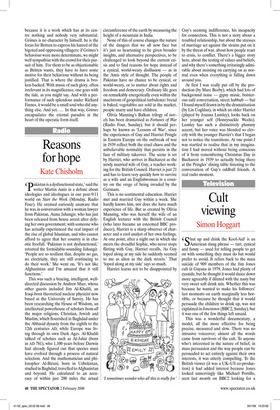Reasons for hope
Kate Chisholm
‘Pakistan is a dysfunctional state,’ said thewriter Martin Amis in a debate about ideologies and ideologues in our post-9/11 world on Start the Week (Monday, Radio Four). He seemed curiously unaware that he was in conversation with a woman lawyer from Pakistan, Asma Jahangir, who has just been released from house arrest after defying her own government; with someone who has actually experienced the real impact of the rise of global Islamism, and who cannot afford to agree that her country is in chaotic freefall. ‘Pakistan is not dysfunctional,’ retorted the formidable-sounding Jahangir. ‘People are so resilient that, despite no gas, no electricity, they are still continuing to do their work.’ She went on, ‘It’s not like Afghanistan and I’m amazed that it still functions.’ This was such a bracing, intelligent, welldirected discussion by Andrew Marr, whose other guests included Jim Al-Khalili, an Iraqi-born theoretical nuclear physicist now based at the University of Surrey. He has been researching the House of Wisdom, an intellectual powerhouse of scholars from all the major religions, Christian, Jewish and Muslim, which flourished in Baghdad under the Abbasid dynasty from the eighth to the 12th centuries AD, while Europe was living through its own Dark Ages. Al-Khalili talked of scholars such as Al-Jahiz (born in AD 781), who 1,100 years before Darwin had already figured out that species must have evolved through a process of natural selection. And the mathematician and philosopher Al-Biruni, born in Uzbekistan, studied in Baghdad, travelled to Afghanistan and beyond. He calculated to an accuracy of within just 200 miles the actual circumference of the earth by measuring the height of a mountain in India.
None of this of course changes the nature of the dangers that we all now face but it’s just so heartening to be given broader insights, and alternative perspectives, to be challenged to look beyond the current crisis and to find reasons for hope instead of a cynical, world-weary disillusion — as in the Amis style of thought. The people of Pakistan have no chance to be cynical, or world-weary, or to mutter about rights and freedom and democracy. Ordinary life goes on remarkably energetically even within the maelstrom of geopolitical turbulence: bread is baked, vegetables are sold in the market, people marry and have children.
Olivia Manning’s Balkan trilogy of novels has been dramatised as Fortunes of War (Radio Four, Sunday), but it should perhaps be known as ‘Lessons of War’, since the experiences of Guy and Harriet Pringle in Eastern Europe on the outbreak of war in 1939 reflect both the cruel chaos and the unbelievable normality that persists in the face of military takeover. The scene is set by Harriet, who arrives in Bucharest as the newly married wife of Guy, a teacher working for the British Council. Harriet is just 21 and has to learn very quickly how to survive as a wife and an Englishwoman in a country on the verge of being invaded by the Germans.
This is no sentimental education. Harriet met and married Guy within a week. She hardly knows him, nor does she have much experience of life. But as created by Olivia Manning, who was herself the wife of an English lecturer with the British Council (who later became an esteemed BBC producer), Harriet is a sharp observer of character and a cool analyst of her own feelings. At one point, after a night out in which she meets the dreadful Sophie, who never stops flirting with Guy, Harriet recalls, ‘As Guy loped along at my side he suddenly seemed to me as alien as the dark streets.’ That ‘loped along at my side’ says so much.
Harriet learns not to be disappointed by Guy’s seeming indifference, his incapacity for connection. This is not a story about a troubled relationship, but about the stresses of marriage set against the strains put on it by the threat of war, about how people react to crisis, to conflict. There’s a bigger story here, about the testing of values and beliefs, and why there’s something irritatingly admirable about insisting on carrying on as normal even when everything is falling down around you.
At first I was really put off by the production (by Marc Beeby), which had lots of background noise — gypsy music, boisterous café conversation, street hubbub — but I found myself drawn in by the dramatisation (by Lin Coghlan), in which an older Harriet (played by Joanna Lumley), looks back on her younger self (Honeysuckle Weeks). Lumley has such a distinctively plummy accent, but her voice was blended so cleverly with the younger Harriet’s that I began not to notice the transitions. At one point I was startled to realise that in my imagination I had moved without being conscious of it from remembering Christmas Day in Bucharest in 1939 to actually being there at the Pringles’ dining table listening to the conversation of Guy’s oddball friends. A real radio moment.


































































 Previous page
Previous page